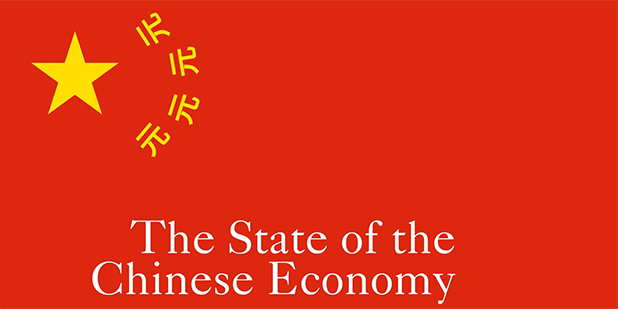On February 25 and 26, 2011, influential scholars from around the world gathered in Los Angeles to discuss China's economy. Presenters explored the economy's strengths and weaknesses and crucial trends in labor, debt, housing, health care and education were illuminated. The enormous social impact of China's changing population and economy was highlighted in presentations on bride prices and how improved nutrition affects educational outcomes. Below is the conference program. Click on the name of the speaker to open a page with a short biographical note and video of the scholar's presentation. Higher resolution videos are also available at the USCI YouTube channel.
USC News article about the conference | USCI YouTube "State of the Chinese Economy" Playlist
Even the most casual news consumer knows China's economy is large and growing fast. Growing at about 10% in 2010, China's gross domestic product is now over US$5 trillion, second only to that of the United States. China now has an estimated $2.6 trillion in foreign exchange reserves.
Headlines, though, are also dominated by other economic news from China. Prices, especially food prices, have been spiking up leading to some hoarding and panic-buying. Labor unrest has prompted governments to mandate minimum wage hikes. Meanwhile most university graduates are finding it difficult to get jobs. Property prices in China's largest cities have risen so fast and high that they've become the subject of soap operas, sparked much discontent, and caused bankers and others to worry about the impact of a possible market meltdown. Income and wealth inequality have grown dramatically since the 1980s. Paying for health care reform and providing for an aging population are also keeping economic planners up at night as they also strive to make China a leader in emerging industries such electric cars and renewable energy.
Economics also looms large in China's foreign affairs. The preeminence of the US dollar as a reserve currency, exchange rates, export controls, market access, and protection of intellectual property are just a few of the issues dominating summit meetings and state visits. Securing supplies of essential resources as well as winning valuable construction contracts has Chinese leaders and businesspeople forging alliances in worldwide. China is the world's top destination for foreign direct investment, but Chinese businesses have also been making big investments abroad.
The conference was possible thanks to generous gifts from Yu Yaping (Chongqing Haitian Company), Lawrence Maltz (Starbucks), and the Harvard-Westlake Global Asia Initiative (Gunter-Gross Endowment).
Welcome
Clayton Dube, USC US-China Institute
Panel 1: The Broad View
Chair: Clayton Dube, University of Southern California
Barry Naughton, University of California at San Diego
“Macroeconomic Imbalances and a Revised Growth Strategy”
Carsten Holz, Hong Kong University of Science and Technology/USC
“China’s Economic Growth 1978-2025: What We Know Today about China’s Economic Growth Tomorrow”
Ho-fung Hung, Indiana University
"Structural Dilemmas in the US-China Currency Conflict"
Discussants:
K.C. Fung, University of California at Santa Cruz
Daniel Lynch, University of Southern California
Panel 2: Debt and Property
Chair: Eugene Cooper, University of Southern California
Victor Shih, Northwestern University
"Awash in Debt: State Liabilities and Monetary and Welfare Implications for China"
Deng Yongheng, National University of Singapore
“Monetary and Fiscal Stimuli, Ownership Structure and China`s Housing Market”
Discussants:
Baizhu Chen, University of Southern California
Robert A. Kapp, Kapp and Associates
Panel 3: Labor
Chair: Stanley Rosen, University of Southern California
Albert Park, Oxford University
“The Chinese Labor Market: Prospects and Challenges”
Li Hongbin, Tsinghua University
"China`s Educational Inequality: Evidence from College Entrance Exams and Admissions"
Discussants:
Ching Kwan Lee, University of California at Los Angeles
Yi Feng, Claremont Graduate University
Keynote Address
Introduction by Elizabeth Garrett, USC Provost and Senior Vice President for Academic Affairs
Presentation by Hu Shuli, Editor in Chief, Caixin Media
"China's Marketplace of Ideas"
Hu Shuli's presentation was off the record.
Panel 4: Human Capital
Chair: Daniel Lynch, University of Southern California
Haizheng Li, Georgia Institute of Technology
“Human Capital in China”
Scott Rozelle, Stanford University
“Education, Health and Nutrition and China`s Human Capital Challenge in the 21st Century”
Discussants:
C. Cindy Fan, University of California at Los Angeles
Guofu Tan, University of Southern California
Panel 5: Paying for the Future: Families and the Nation
Chair: Merril Silverstein, University of Southern California
Xiaobo Zhang, International Food Research Institute
"Bride Prices and House Prices"
John Strauss, University of Southern California
“As China Ages: Elderly Health Outcomes and Socioeconomic Status”
Discussants:
Brett Sheehan, University of Southern California




